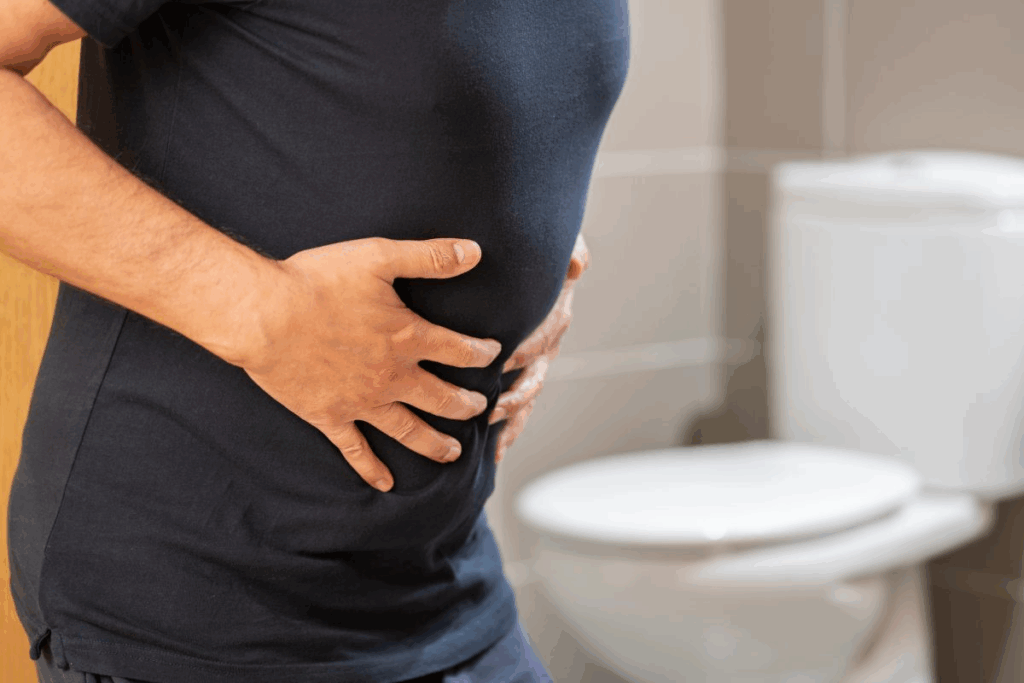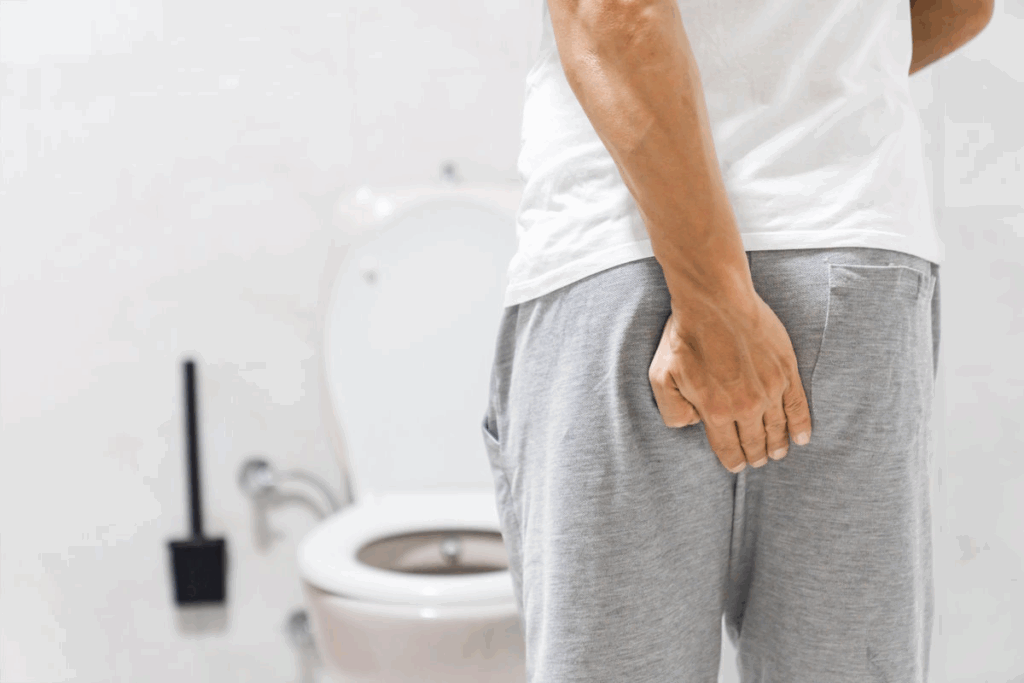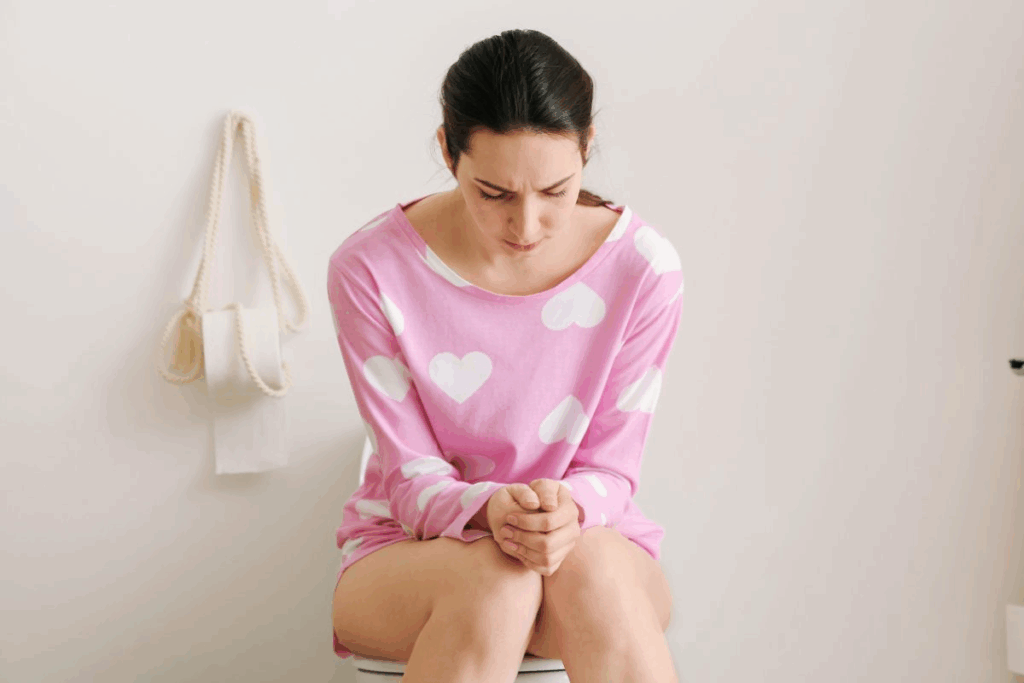Last Updated on October 30, 2025 by Bilal Hasdemir

Diarrhea after surgery is a common issue for many patients. It can be mild or very severe and last a long time.Learn what causes diarrhea after operation and effective ways to manage and prevent complications.
At Liv Hospital, we focus on keeping patients safe and providing top-notch care. Knowing about post-operative diarrhea is key to the best recovery. Diarrhea is when you have three or more loose stools a day. It can happen because of diet changes or new medicines before or after surgery.

Diarrhea after surgery is a common problem that can harm patients. It’s important to understand why it happens and how to manage it. This helps improve care for patients.
Research shows that up to 8% of people who have surgery get diarrhea. This fact shows that doctors need to be ready to handle this issue. They should have plans to manage it.
The chance of getting diarrhea after surgery changes based on the surgery and the patient. For example, surgeries in the gut area are more likely to cause diarrhea.
| Procedure Type | Incidence of Diarrhea | Patient Demographics |
| Gastrointestinal Surgeries | Higher | Varied |
| Orthopedic Surgeries | Lower | Elderly Patients |
| Bariatric Surgeries | Moderate to High | Obese Patients |
Knowing how different surgeries and patients affect the risk of diarrhea is key. It helps doctors better prepare for and manage this issue.

Diarrhea after surgery can range from mild and short-lived to severe and long-lasting. This difference in symptoms comes from various factors. These include the surgery type, the patient’s health, and how they react to the surgery.
Some patients have mild diarrhea that goes away in a few days. This is often due to temporary gut changes or the body’s stress response to surgery. At the other end, some people face severe, long-lasting diarrhea.
Dealing with chronic diarrhea after surgery is tough. It can cause dehydration, malnutrition, and lower quality of life. Knowing the causes and risk factors is key to treating it well.
The time diarrhea lasts after surgery varies a lot. Some get better quickly, while others face a long struggle. Studies show that surgery type, patient details, and care after surgery affect how long and how diarrhea progresses.
Diarrhea right after surgery often comes from the body’s stress response or anesthesia’s effect on the gut. Diarrhea later on might be due to antibiotics or diet changes.
Knowing these patterns helps doctors better manage post-surgical diarrhea. This ensures patients get the right care for their needs.
Knowing why diarrhea happens after surgery is key to better care. Diarrhea can slow down recovery, hurting health and causing more problems.
Antibiotics often cause diarrhea after surgery. They upset the balance of good bacteria in the gut, letting bad bacteria grow. This can lead to antibiotic-associated diarrhea, which can be mild or severe.
The chance of getting diarrhea from antibiotics depends on the type, how long you take it, and your health. Doctors must decide if the benefits of antibiotics are worth the risk to your gut.
Surgery causes stress that can upset the gut. How much it affects you depends on the surgery’s type and length. Surgical stress can make bowel habits change, including diarrhea, as your body heals.
Anesthesia can also cause diarrhea after surgery. Some anesthetics can slow or speed up how fast the gut moves. The effect on bowel function varies by anesthetic and how you react to it.
Infections after surgery, like those from Clostridium difficile, can also cause diarrhea. These infections might come from the surgery or care after it. Quick action to treat infections is key to managing diarrhea and avoiding more issues.
| Cause | Description | Impact on Diarrhea |
| Antibiotic Use | Disrupts gut flora balance | High risk of antibiotic-associated diarrhea |
| Surgical Stress | Triggers inflammatory response | Can lead to changes in bowel habits |
| Anesthesia | Affects bowel motility | Can cause diarrhea or constipation |
| Post-Operative Infections | Increases risk of infectious diarrhea | Can lead to severe diarrhea, potentially life-threatening |
Knowing these causes helps doctors find better ways to manage diarrhea after surgery. By tackling the root causes, patients get care that helps them feel better and recover faster.
It’s important to know how anesthesia affects bowel function. This knowledge helps in managing recovery and avoiding issues like diarrhea. Anesthesia is key in surgery, making procedures painless and changing medical care.
Different anesthetics can slow down or speed up bowel movements. This can lead to diarrhea or other stomach problems. The effect of anesthesia on the bowel depends on the anesthetic, surgery length, and patient health.
Each anesthetic has its own effect on the stomach. Volatile anesthetics can slow down stomach movement. Some intravenous anesthetics might not affect bowel movements as much. The anesthetic used can impact how well the bowel works after surgery.
| Anesthetic Agent | Effect on Bowel Motility | Potential Post-Operative Effect |
| Volatile Anesthetics | Decreased motility | Constipation |
| Intravenous Anesthetics | Variable effect | Variable |
| Opioids | Significant decrease | Constipation, possible bowel obstruction |
Anesthesia doesn’t directly cause diarrhea, but it can lead to bowel problems in some. The link between anesthesia and diarrhea after surgery is complex. It depends on the surgery, anesthetics, and patient health.
Key Takeaway: Anesthesia can indirectly cause bowel issues, but it’s not the main reason for diarrhea. Knowing the many factors that lead to stomach problems after surgery is key to managing them.
Surgeries, like those in the gastrointestinal tract, can cause diarrhea after surgery. The risk changes based on the surgery type.
The chance of getting diarrhea after surgery depends on the surgery type. Some surgeries have a higher risk because they affect the digestive system more.
Gastrointestinal surgeries directly impact the bowel. Operations like resections, bypass surgeries, or repairs can change how the bowel works. This can lead to diarrhea.
For example, removing parts of the intestine can change how the body absorbs nutrients and water. This can cause diarrhea.
Bariatric surgery helps obese people lose weight. It can also affect bowel function. Some procedures, like those that bypass parts of the small intestine, can cause malabsorptive diarrhea.
This diarrhea happens because the surgery reduces nutrient absorption. Undigested food then reaches the colon, causing diarrhea.
Laparoscopic surgeries are less invasive than open surgeries. They can also affect bowel function. The use of carbon dioxide can irritate the bowel, leading to diarrhea.
But, bowel recovery after laparoscopic surgery is faster. This might reduce the risk of long-term diarrhea.
Hysterectomy is a common surgery that can lead to unexpected complications like diarrhea. This section explores how hysterectomy affects bowel habits and causes diarrhea.
Diarrhea after a hysterectomy can show up in different ways. Some people get yellow diarrhea, while others get watery diarrhea. Knowing the causes and effects of these types is key to managing them well.
Yellow diarrhea after hysterectomy can happen for several reasons. Changes in bile flow or disruptions in gut flora are common causes. The surgery can also mess with how the digestive system works, changing stool color and consistency.
Yellow diarrhea might mean there’s an imbalance in gut bacteria or a problem with bile production. It’s important for patients to tell their doctors about these symptoms for proper care.
Watery diarrhea after gynecological surgeries like hysterectomy can be due to the body’s reaction to surgery. Changes in bowel movement and the effects of anesthesia and post-op meds also play a role.
Those with watery diarrhea should drink plenty of water and might need to change their diet for a while. Sometimes, medical help is needed to find and fix the underlying cause.
In summary, while hysterectomy is a big surgery, knowing its effects on bowel habits helps with care after surgery. Recognizing and addressing post-operative diarrhea symptoms is important for both patients and doctors to improve recovery.
Diarrhea after surgery can be more than just an uncomfortable side effect; it can signal serious infectious complications. When patients experience diarrhea following an operation, it’s important to check if it’s due to an infection. If so, they need quick treatment.
Clostridium difficile, or C. diff, is a big worry after surgery. It can cause severe diarrhea and colitis, mainly in those who’ve taken antibiotics. The chance of getting C. diff is higher in hospitals because of the risk of exposure.
The Centers for Disease Control and Prevention (CDC) says C. diff is a major health threat. “C. difficile is an urgent threat because of its impact on healthcare facilities and the community, as well as its resistance to some antibiotics,” the CDC states.
| Risk Factors for C. diff Infection | Description |
| Recent antibiotic use | Exposure to antibiotics increases the risk of C. diff infection by disrupting normal gut flora. |
| Hospitalization | Being in a healthcare setting increases the risk of exposure to C. diff spores. |
| Age and underlying health conditions | Older adults and those with certain health conditions are more susceptible to C. diff infection. |
Other hospital-borne pathogens can also cause diarrhea in post-surgical patients. These include bacteria, viruses, and parasites. They can spread through contaminated surfaces, healthcare workers, or other sources in hospitals.
A study in the Journal of Hospital Infection shows the importance of cleaning and infection control. It helps reduce the spread of these pathogens.
Getting a correct diagnosis is key to figuring out why post-operative diarrhea happens. Tests like stool tests can find pathogens like C. diff. Other tests check the patient’s overall health and dehydration.
A clinical guideline says, “Stool testing for C. difficile should be performed using a validated assay that detects toxin-producing organisms.”
Finding out what’s causing diarrhea early helps start the right treatment. This can greatly improve patient outcomes and lower the risk of more problems.
Post-operative diarrhea needs careful nutritional management to aid recovery. Good nutrition helps in healing and lowers the risk of complications. It also supports the recovery process.
When you have diarrhea after surgery, choosing the right foods is key. A diet rich in soluble fiber, like bananas and oatmeal, can help firm up your stool. Also, foods that are easy to digest, such as toast and boiled vegetables, are good choices.
It’s important to avoid foods that can upset your stomach. This includes spicy, fatty, and high-fiber foods. Adding probiotics, found in yogurt or supplements, can help balance your gut flora.
Hydration strategies are essential for managing post-operative diarrhea. Drinking lots of fluids helps replace lost water and electrolytes. Oral rehydration solutions, like those from the World Health Organization, are very effective.
Drinking electrolyte-rich beverages or broths can also help keep electrolyte levels balanced. It’s best to avoid caffeinated and alcoholic drinks, as they can make dehydration worse.
If you have severe diarrhea, electrolyte replacement might be needed. This could mean drinking electrolyte-rich drinks or, in some cases, getting electrolytes through an IV under a doctor’s watch.
Diarrhea after surgery is a big worry. But, there are proven treatments that can help. It’s key to manage post-surgical diarrhea well for a smooth recovery.
Medicines are a big help in treating post-surgical diarrhea. Antidiarrheal medications help by making diarrhea less frequent. Loperamide is often used because it slows down the gut.
But, it’s important to take these medicines only as a doctor tells you to. This is to avoid any bad side effects.
Other medicines might be needed too. For example, antibiotics for infections or anti-inflammatory drugs for inflammation.
Probiotics are getting more attention for helping with diarrhea. Probiotics for diarrhea are good when diarrhea is caused by antibiotics or upset gut bacteria.
“Probiotics can help in the recovery of the gut microbiota following surgery and antibiotic therapy.”
When picking probiotics, look for ones with proven benefits. Strains like Lactobacillus and Bifidobacterium are often recommended.
In some cases, targeted therapies are needed for specific reasons of diarrhea. For example, if it’s caused by Clostridium difficile, special antibiotics like vancomycin or fidaxomicin might be given.
Using a detailed plan with proven treatments helps doctors manage post-surgical diarrhea well. This leads to better results for patients.
It’s important for patients to know when to seek medical help after surgery. Some cases of diarrhea after surgery might get better on their own. But, others could mean serious problems that need quick action.
Some symptoms with diarrhea after surgery are serious. These red flags include:
Dehydration is a big problem with diarrhea after surgery. Watch for signs like:
If you notice these, it’s key to rehydrate and talk to a doctor.
Severe or ongoing diarrhea after surgery might mean treatment isn’t working. This could be due to an infection, a bad reaction to medicine, or another issue. If your diarrhea doesn’t get better or gets worse, see your doctor for help.
Knowing these warning signs and acting fast can greatly improve your recovery and health.
Preventing post-operative diarrhea starts with a proactive approach. Healthcare providers can lower the risk of complications by understanding and using effective prevention strategies. This improves patient outcomes.
Getting ready for surgery is key to avoiding diarrhea later on. It involves checking the patient’s health, managing chronic conditions, and improving nutrition. Pre-operative nutritional support helps the patient handle surgery better.
A study in the Journal of Surgical Research found that better nutrition before surgery cuts down on complications like diarrhea.
“Pre-operative nutritional support is essential for reducing post-operative complications.”
Nutrition in Clinical Practice
Using antibiotics wisely is vital in preventing diarrhea after surgery. The right use of antibiotics helps keep the gut’s natural balance. Selecting the appropriate antibiotic and not overusing it are important.
| Antibiotic Stewardship Strategies | Benefits |
| Appropriate antibiotic selection | Reduces risk of antibiotic resistance |
| Limited duration of antibiotic therapy | Minimizes disruption of gut flora |
Moving around early after surgery helps the bowels work better. It also lowers the chance of ileus and diarrhea. A balanced diet rich in fiber helps keep bowel movements regular.
Hydration is key to avoiding dehydration from diarrhea. Drinking lots of fluids helps keep electrolytes balanced.
Managing post-operative diarrhea is key for a smooth recovery. Knowing the causes, risks, and treatments helps patients feel more in control.
Being informed about what to expect and how to manage symptoms is important. This knowledge helps patients avoid complications and improves their recovery. They should understand that diarrhea can be caused by antibiotics and surgery.
Effective recovery management includes good nutrition, proven treatments, and knowing when to get medical help. By being proactive and setting realistic goals, patients can lessen the impact of diarrhea on their lives.
In the end, an informed patient is better prepared to face post-operative diarrhea. This ensures a successful and less stressful recovery.
Diarrhea after surgery can happen for many reasons. It might be due to antibiotics messing with your gut. Or it could be from the stress of surgery, how anesthesia works, or infections.
Anesthesia might affect your bowel and lead to diarrhea. But it’s not the main cause. Different anesthetics can affect your digestive system in different ways.
Yellow diarrhea after a hysterectomy might be your body’s reaction to the surgery. It could also be from changes in how you go to the bathroom or bile in your stool. Always talk to your doctor to find out why.
Surgery on your gut can mess with how you digest food, leading to diarrhea. The risk depends on the surgery. Some surgeries might make diarrhea worse.
To manage diarrhea after surgery, eat right, drink plenty of water, and replace lost salts. Your doctor might suggest medicine or probiotics to help.
If you have severe dehydration, bloody stools, or a lot of pain, get help right away. Fever and not getting better with treatment are also red flags. Don’t wait if you see these signs.
Yes, C. diff infection can cause diarrhea after surgery. It’s linked to antibiotics and can be tested for.
To prevent diarrhea, prepare well before surgery, use antibiotics wisely, move around early, and eat right. Your doctor can give you advice to lower your risk.
Yes, to manage diarrhea, drink lots of water, eat foods with lots of salts, and avoid foods that can make it worse. Your doctor can give you specific advice.
Probiotics might help by keeping your gut healthy. But talk to your doctor before taking them, as research is ongoing.
Dehydration signs include being very thirsty, dark urine, feeling dizzy, and not making much urine. If you notice these, get medical help fast.
Ng, A. P., et al. (2024). Outcomes of surgery for inflammatory bowel disease: A comprehensive review. World Journal of Gastroenterology. https://pubmed.ncbi.nlm.nih.gov/39341587/
Subscribe to our e-newsletter to stay informed about the latest innovations in the world of health and exclusive offers!
WhatsApp us